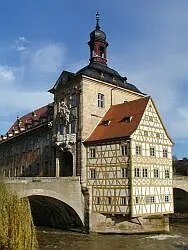Welcome to SYNCHRON 2024

International Open Seminar on Synchronous Reactive Programming
Date: November 18-22, 2024
University Aula, Bamberg, Germany.
The 31st International Open Seminar on Synchronous Reactive Programming 2024 will be hosted by the Otto-Friedrich University of Bamberg and held in the Dominican Church University Aula located in the UNESCO World Heritage Site of Old Town Bamberg in Upper Franconia.
Invited Speakers:
- Koen Claessen, Chalmers University of Technology, Gothenburg, Sweden
- Jean-Baptiste Jeannin, Department of Aerospace Engineering, University of Michigan at Ann Arbor, USA
- Romain Michon, INRIA, INSA Lyon, Centre National de Création Musicale (GRAME), France
Description
Synchronous languages have been introduced in the 1980s to program safety-critical reactive and embedded systems. Such systems are characterised by their continuous concurrent interaction which is synchronised by logical clocks that ensure reactive progress, bounded resource consumption and functional determinacy. The key advantage of the synchronous approach is its rigorous mathematical semantics which allows to build software tools to support correct-by-verification or correct-by-construction code generation for the programmers to develop critical embedded software faster and better.
SYNCHRON is the yearly rendezvous for all researchers working in or around the field of synchronous programming. It is an open forum where students and researchers can present and discuss about ongoing work on the numerous topics related to synchronous programming: language design, compilation, validation, case-studies, models of computation and communication, domain-specific languages, concurrency and scheduling theory, modeling pragmatics etc.
SYNCHRON is a friendly gathering for lively discussions and presentations. There is no formal reviewing/publication process, but participants will be invited to share materials through the website of the workshop. Thus, this is the perfect place to present on-going, yet unpublished work, or work that has already been presented elsewhere in a related venue (EMSOFT, MEMOCODE, FDL, DATE, DAC, CPS-IoT, PLDI, CC, POPL, ESOP, SCOPES, etc.).
The workshop topics cover, but are not restricted to, the following topics:
- Synchronous and asynchronous models for time and concurrency
- Safety-critical real-time systems
- Synchronous languages and programming formalisms
- Synchronous hybrid models for control theory
- Relaxed models of synchrony such as sparse synchrony and logical execution time
- Compilation techniques and code synthesis for single/multi-threaded, multi-core, multi-processing architectures
- Formal specification, type theories and model-theoretic verification
- Test and validation of programs
- Modelling and simulation environments
- Timing and other non-functional analysis for synchronous programs
- Component-based development of (synchronous) embedded systems
- Discrete and hybrid systems
- High-level hardware modeling and synthesis
- Novel language paradigms blending synchrony with asynchrony and non-determinism
- semantic abstraction and refinement
- Design methodologies, visualisation of complex reactive systems
- Case-studies, industrial and teaching experience reports
Previous editions of this workshop were held in:
- Kiel (Germany, 2023)
- Fréjus (France, 2022)
- La Rochette (France, 2021)
- Online (Worldwide,2020)
- Aussois (France, 2019)
- Fréjus (France, 2018)
- Rennes (France, 2017)
- Bamberg (Germany, 2016)
- Kiel (Germany, 2015)
- Aussois (France, 2014)
- Dagstuhl (Germany, 2013)
- Le Croisic (France, 2012)
- Dammarie-les-Lys (France, 2011)
- Fréjus (France, 2010)
- Dagstuhl (Germany, 2009)
- Aussois (France, 2008)
- Bamberg (Germany, 2007)
- L'Alpe d'Huez (France, 2006)
- Qwara (Malta, 2005)
- Dagstuhl (Germany, 2004)
- Luminy (France, 2003)
- La Londe les Maures (France, 2002)
- Dagstuhl (Germany, 2001)
- Saint-Nazaire (France, 2000)
- Hyères (France, 1999)
- Gandia (Spain, 1998)
- Roscoff (France, 1997)
- Dagstuhl (Germany, 1996)
- Luminy (France, 1995)
- Dagstuhl (Germany, 1994)
Our Sponsors
The event is kindly supported by the Technologieallianz Oberfranken TAO, ANSYS and the German Research Foundation (DFG).


